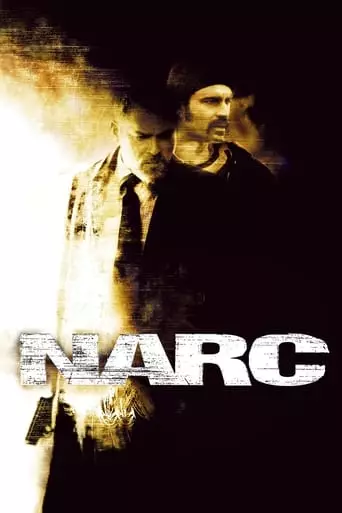When the trail goes cold on a murder investigation of a policeman, an undercover narcotics officer is lured back to the force to help solve the case.
Narc is a 2002 American neo-noir crime thriller directed and written by Joe Carnahan, featuring Jason Patric and Ray Liotta in leading roles. The film delves into the gritty world of narcotics enforcement, exploring themes of morality, justice, and the personal costs of law enforcement.
The story follows Nick Tellis (Jason Patric), a former undercover narcotics officer who is reinstated to investigate the murder of his former partner, Michael Calvess. Reluctantly, Tellis partners with Detective Henry Oak (Ray Liotta), a seasoned and intense officer known for his unorthodox methods. As they delve deeper into the investigation, they uncover a web of corruption and deceit within their own department, challenging their perceptions of justice and loyalty.
The film is noted for its raw and unflinching portrayal of the challenges faced by law enforcement officers, highlighting the moral ambiguities and personal sacrifices inherent in the pursuit of justice. The dynamic between Tellis and Oak adds depth to the narrative, showcasing the complexities of their partnership and individual struggles.
Main Themes in Narc
- Moral Ambiguity and Justice: Narc explores the complex nature of justice, questioning the ethical boundaries of law enforcement. The film portrays characters who operate in morally gray areas, challenging traditional notions of right and wrong.
- Corruption Within Law Enforcement: The narrative delves into the theme of corruption within the police force, revealing how systemic issues can compromise the integrity of individuals and the institution as a whole.
- Personal Sacrifice and Redemption: The film examines the personal costs of being a law enforcement officer, including the impact on family relationships and personal well-being. It also touches on themes of redemption, as characters seek to atone for past mistakes.
- The Impact of Trauma: Narc highlights how past traumas influence the behavior and decisions of the characters, particularly focusing on the psychological scars left by violent encounters and the loss of colleagues.
Impact of Narc
Upon its release, Narc received critical acclaim for its intense storytelling and powerful performances, particularly by Jason Patric and Ray Liotta. The film was praised for its realistic depiction of the challenges faced by law enforcement officers and its unflinching approach to the subject matter. It holds a rating of 84% on Rotten Tomatoes, with the consensus stating, Jason Patric and Ray Liotta are electrifying in this gritty, if a little too familiar, cop drama.
The film’s success has led to its inclusion in discussions about the best crime thrillers of the early 2000s, influencing subsequent films in the genre. Its realistic portrayal of police work and the moral complexities involved has been cited as a benchmark for authenticity in crime dramas.
7 Reasons to Watch Narc (2002)
- Authentic Depiction of Law Enforcement: Narc offers a raw and unfiltered look into the world of narcotics enforcement, providing viewers with an authentic portrayal of the challenges and moral dilemmas faced by law enforcement officers. The film’s realistic approach sets it apart from more stylized crime dramas, offering a gritty and immersive experience.
- Compelling Performances: The film features standout performances by Jason Patric and Ray Liotta, who bring depth and complexity to their respective roles. Their dynamic on-screen chemistry enhances the narrative, making their partnership both believable and engaging.
- Intense and Suspenseful Narrative: Narc delivers a tightly woven plot filled with suspense and unexpected twists. The film keeps viewers on the edge of their seats, with each revelation adding layers to the story and deepening the intrigue.
- Exploration of Complex Themes: The film delves into profound themes such as moral ambiguity, corruption, and personal sacrifice. It challenges viewers to consider the ethical complexities of law enforcement and the personal costs associated with the pursuit of justice.
- Realistic Portrayal of Urban Decay: The setting of Detroit’s gritty neighborhoods serves as a powerful backdrop, reflecting the themes of decay and corruption. The film’s cinematography captures the bleakness of the environment, enhancing the overall atmosphere and tone.
- Thought-Provoking Character Development: Narc offers deep character development, allowing viewers to understand the motivations and struggles of the protagonists. This depth adds emotional weight to the narrative, making the characters’ journeys both compelling and relatable.
- Critical Acclaim and Recognition: The film has been recognized for its excellence in filmmaking, receiving positive reviews from critics and audiences alike. Its inclusion in discussions about the best crime thrillers of the early 2000s underscores its impact and enduring relevance in the genre.
How Will You Feel After Watching Narc (2002)?
After watching Narc, you may experience a range of emotions, from the tension and suspense of the narrative to the empathy for the complex characters. The film’s exploration of moral ambiguity and personal conflict may leave you reflecting on the nature of justice, identity, and redemption. The intense performances and gripping storyline are likely to resonate, prompting discussions about the film’s themes and its portrayal of the urban underworld. Overall, Narc offers a thought-provoking and emotionally charged cinematic experience that lingers long after the credits roll.

